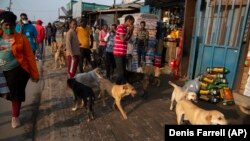From Seoul in South Korea to Chile in Santiago, governments, private investors and charities have also sought to revive degraded urban areas to make them safer places to work and live in — with varying degrees of success.
Johannesburg's latest inner-city projects, supported by the presidential post-COVID-19 employment stimulus, range from funding informal street book sellers promoting African literature to agricultural projects run by the homeless.
The national employment stimulus has pushed some 32.6 billion rand ($1.72 billion) to more than 1 million people either through jobs or internships around the country, according to government statistics.
Johannesburg Inner City Partnership, JICP, the body facilitating the funding to the inner-city groups, has helped channel 25 million rand to some 40 organizations such as Boundless City that are creating safe spaces to play and learn.
The projects have created an estimated 2,000 part-time jobs since November last year, almost 70% of which have gone to youth in the area and 60% to women, JICP said.
Nationwide, the Presidential Employment Stimulus, PES, has boosted the largest youth employment program in South Africa's history, said Kate Philip, the PES lead.
But about 33% of South Africans are jobless, making it the country with one of the world's highest unemployment rates, according to the International Monetary Fund.
The PES program was announced in October 2020 when President Cyril Ramaphosa pledged to create much-needed jobs following losses during the pandemic.
Right now, funds for all PES programs terminate in March 2024, with any possibility of continuation currently being assessed by the Treasury, said Kate Philip, the PES lead.
The inner-city funding is designed to support dozens of "hero organizations in civil society," she said.
But such government interventions are not meant to be long-term solutions to tackling unemployment, said Lauren Graham, director of the University of Johannesburg's Centre for Social Development in Africa.
"They're meant to be work opportunities that allow an individual to gain skills...(and) a better foothold in the labor market," she said by email.
Even if short-lived, these programs help "de-risk" youth unlikely to get jobs without prior work experience, said Philip.
JICP also points to examples of innovation by the local charities they help fund that will hopefully ensure their sustainability.
The Johannesburg Homelessness Network has trained dozens of individuals to farm and sell their produce to shelters in order to pay rent and get off the streets.
Water for the Future has secured training for 110 staff members to undergo permaculture and aquaponic lessons through the University of Johannesburg, with each participant gifted gardening tools and equipment.
Romy Stander, founder of Water for the Future, said it was about "getting people's confidence back."
"We're investing in people so they can keep growing even if the funding runs out," she said.















Forum